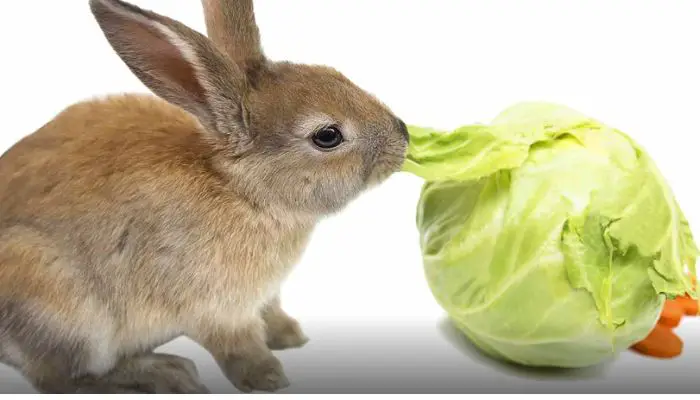Rabbits can eat cabbage in moderation as part of a balanced diet. It is beneficial to them due to its high fiber content and vitamins and minerals, but should only be fed occasionally with other greenery to minimize the risk of gas problems.
Benefits and Risks: The Pros and Cons of Feeding Cabbage to Your Rabbit
As a rabbit owner, you want to provide your furry friend with a healthy and balanced diet. You may be wondering if it’s safe to feed your rabbit cabbage, a popular green leafy vegetable.
While cabbage can be a healthy addition to your rabbit’s diet, there are both benefits and risks associated with feeding it. In this article, we’ll discuss the pros and cons of feeding cabbage to your rabbit.

Benefits of Feeding Cabbage to Your Rabbit
Cabbage is a nutrient-dense vegetable that can provide many health benefits to your rabbit.
Here are a few of the benefits of feeding cabbage to your rabbit:
Nutritious
Cabbage is a good source of vitamins and minerals that are essential for your rabbit’s health. It contains vitamin C, which is important for a rabbit’s immune system, as well as vitamin K, which is important for blood clotting. Cabbage is also rich in fiber, which is important for maintaining healthy digestion.
Low in calories
Cabbage is a low-calorie food, which means that it can help your rabbit maintain a healthy weight. Obesity can lead to health problems in rabbits, so it’s important to provide them with a balanced diet that includes low-calorie foods.
Variety
Rabbits need a varied diet to stay healthy and to prevent boredom. Feeding your rabbit cabbage can provide a change of pace from their regular diet of hay and pellets.
Hydration
Cabbage is high in water content, which can help keep your rabbit hydrated. Hydration is important for maintaining healthy digestion and preventing health problems.
Risks of Feeding Cabbage to Your Rabbit
While cabbage can be a healthy addition to your rabbit’s diet, there are also some risks associated with feeding it. Here are a few of the risks of feeding cabbage to your rabbit:
Digestive problems
Rabbits have a delicate digestive system, and feeding them too much cabbage can cause digestive problems like gas and diarrhea. Cabbage contains complex sugars that can be difficult for rabbits to digest, especially if they eat too much.
Calcium imbalance
Cabbage is high in calcium, which can cause a calcium imbalance in rabbits if they eat too much of it. Too much calcium can lead to health problems like bladder sludge and urinary tract infections.
Goitrogens
Cabbage contains goitrogens, which are substances that can interfere with the function of the thyroid gland. While goitrogens are not harmful in small amounts, feeding your rabbit too much cabbage can cause thyroid problems.
Allergic reactions
Some rabbits may be allergic to cabbage, and feeding it to them can cause an allergic reaction. Symptoms of an allergic reaction can include diarrhea, vomiting, and skin rashes.
Tips for Feeding Cabbage to Your Rabbit
If you decide to feed cabbage to your rabbit, it’s important to do so in moderation and to follow these tips:
Introduce it slowly
If your rabbit has never eaten cabbage before, introduce it slowly and in small amounts. This will allow their digestive system to adjust to the new food.
Monitor for digestive problems
Watch your rabbit closely for any signs of digestive problems like gas and diarrhea. If you notice any problems, reduce the amount of cabbage you’re feeding them.
Wash it thoroughly
Make sure to wash the cabbage thoroughly before feeding it to your rabbit. This will remove any dirt or pesticides that may be on the leaves.
Feed it as a treat
Cabbage should be fed as a treat and not as a replacement for your rabbit’s regular diet of hay and pellets. Feeding too much cabbage can lead to health problems, so it’s important to feed it in moderation.
Mix it with other vegetables
To provide a balanced diet, it’s important to mix cabbage with other vegetables. Good options include leafy greens like kale and spinach, and vegetables like carrots and bell peppers.
Cook it before feeding
Cooking cabbage can make it easier to digest for rabbits. However, make sure to avoid adding any salt or seasonings, as these can be harmful to rabbits.
Remove any uneaten cabbage
If your rabbit doesn’t finish their cabbage, make sure to remove any uneaten leaves from their enclosure. This will help prevent digestive problems and keep their environment clean.
Conclusion
Cabbage can be a healthy addition to your rabbit’s diet, but it’s important to feed it in moderation and to be aware of the risks associated with feeding it.
While cabbage can provide many health benefits, including vitamins, minerals, and hydration, it can also cause digestive problems, calcium imbalances, and thyroid problems if fed in excess.
If you decide to feed cabbage to your rabbit, make sure to introduce it slowly, monitor for digestive problems, wash it thoroughly, and feed it as a treat.
By following these tips, you can provide your rabbit with a healthy and balanced diet that includes cabbage as a nutritious addition.
Related Question On Can Rabbits Eat Cabbage
Can rabbits eat cabbage everyday?
No, rabbits should not eat cabbage every day because it can cause digestive problems and a calcium imbalance.
How often can rabbits eat cabbage?
Rabbits can eat cabbage in small amounts occasionally as a treat, but not every day.
